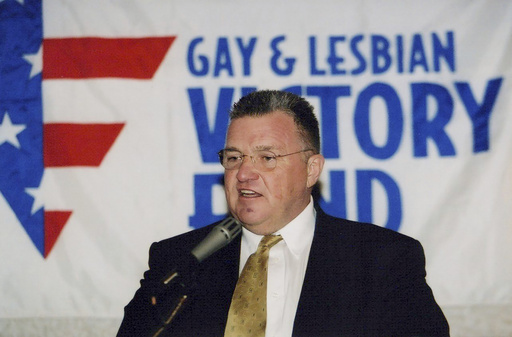NEW YORK (AP) — David Mixner, a longtime LGBTQ+ activist who was an adviser to Bill Clinton during his presidential campaign and later called him out over the “Don’t Ask, Don’t Tell” policy regarding gay, lesbian, bisexual, transgender or queer personnel in the military, has died. He was 77.
Mixner died Monday at his home in New York City, according to Annise Parker, president and CEO of the LGBTQ+ Victory Fund. Mixner had been in hospice for some time, Parker said. In 1991, Mixner was one of the founding members of the organization that recruits and supports LGBTQ+ political candidates.
“David was a courageous, resilient and unyielding force for social change at a time when our community faced widespread discrimination and an HIV/AIDS crisis ignored by the political class in Washington, DC,” the Victory Fund said in a statement Monday. “In 1987, David joined one of the first HIV/AIDS protests outside the Reagan White House, where police wore latex gloves because of the stigma and misinformation around HIV/AIDS,” and was arrested.
Mixner believed that the LGBTQ+ community needed to be visibly and consistently involved in the political process and “dragged people along with him,” said Parker, the former mayor of Houston, Texas. He was social and witty and had a big personality, she said, but added that it was his moral compass that people should remember the most: He was willing to speak up and stand up.
“He got other people to be involved but he also held people accountable,” Parker said. “When politicians didn’t make their commitments, he was willing to call them out on it.”
Mixner grew up in Elmer, New Jersey, according to the New Jersey Hall of Fame, which he was inducted into in 2021.
Mixner’s father, Benjamin, was a farmer and his mother, Mary, was a homemaker and notary and later a bookkeeper for the local John Deere dealership, according to his niece, Lizzy Yates. His sister, Patsy Annison, died in 2018 and he is survived by his brother, Melvin Mixner, Yates said.
He attended Arizona State University and the University of Maryland and later helped organize efforts to end the war in Vietnam and worked for political campaigns. He also wrote several books, including a memoir “Stranger Among Friends.”
In a statement, Mixner’s family said they were grieving the loss of a much loved brother and uncle, who at age 6 was convinced by his brother that he could fly and if he ran fast enough, he wouldn’t fall from the hayloft and break an arm.
“He taught us to open our arms and our hearts. He taught us to stand up for those things and people who we hold dear,” the statement read. “He taught us to try to at least try to fly because bones heal.”
Mixner, who was credited with raising millions of dollars for Clinton from gay and lesbian voters, angered the White House in 1993 by attacking then-U.S. Sen. Sam Nunn, D-Ga. In a speech, Mixner called Nunn, chairman of the Senate Armed Services Committee, an “old-fashioned bigot” for opposing Clinton’s plan to lift the ban on gays in the military.
When Clinton began to compromise with Congress and the Pentagon on the issue later that year, Mixner accused the White House of misleading gay leaders. He said Clinton “sacrificed the freedom of millions for your own political expediency.” Days later, Mixner was among more than two dozen people arrested in front of the White House in a protest of Clinton’s retreat from his campaign pledge to lift the ban by executive order.
Neil Giuliano, the former mayor of Tempe, Arizona, traveled to New York last month to visit with Mixner, whom he had known for decades, and they talked about politics and life and the afterlife.
“Facing death compels one to be totally bare and totally honest,” he said.
Giuliano described Mixner as an “activist with grace” who was influential with people at all levels.
“It’s not like he wasn’t angry, but he came forward with a way of talking about issues and with such grace and he presented in such a way that brought people in and didn’t keep people out,” said Giuliano, who now serves on the LGBTQ+ Victory Fund’s board. “I think that’s why so many people were drawn to him.”



